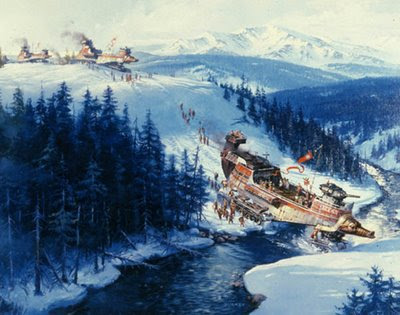 |
| Like Risk, but with better figures. And an end to the game. |
I'm a New World archaeologist, so I was a little saddened by the relative unimportance of the Americas in the game (at least until the final two epochs). It was fun to watch an alternative history play out on the board -- what happens, for example, when no player draws the Turks and they disappear from history? Or when a tradition sea power like Portugal decides that, because of the conditions on the board, they are going to strike in-land and take northern Europe, abandoning their naval aspirations? The whole night I was wishing that we had taken some kind of stop-motion video that would show the expansion and collapse of these historic powers, all in technicolor, spread out across the board. With infinite time, one could write an alternative history of the world based on the results of a session of the game.
 |
| Portuguese Land Galleons strike deep into Gothic Northern Europe. |
I'm a sucker for alternative histories, so I enjoyed watching Charlemagne fail miserably and seeing the Goths consolidate Northern Europe and hold it for centuries. I also enjoyed kicking ass through the entire middle of history, just to be obliterated by globalization and coming in third. In honor of imagining historic processes, I went back and re-read R.E. Howard's essay on the Hyborian Age, an awesome alternative history that Howard used as the backdrop for his Conan and Kull the Conquerer stories. An adaptation of that essay can be found here. The evening also put me in mind of the Age of Unreason series by J. Gregory Keyes, a man directly (and indirectly) responsible for a few of my scars. Greg imagines a world where alchemy works, in which the Age of Exploration is drastically altered by scientist-sorcerers like Newton and Ben Franklin and their meddling. It is a great read, and since Greg is an expert in Native Southeastern mythology and folklore, there's some good anthropology in there as well.
No session update this week --- presumably the party hung out in the courtyard of that Dwarven monastery eating dried trail rations and talked about how unpleasant it is to be shot through with arrows. Stay tuned for next week's adventure, which may feature a wyvern, a pot roast, and/or the inconvenient melting of various PCs.
 |
| Mel Brooks knows a little something about historic truths. |

No comments:
Post a Comment